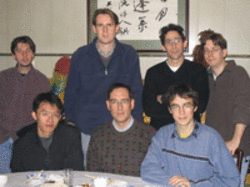This fascinating book review by the WaPo’s John Pomfret looks at the banned-in-China biography, Zhou Enlai’s Later Years, by Gao Wenqian, a former CCP researcher for more than a decade prior to emigrating to the US.
He depicts Zhou as a tragic backroom schemer, a puppet of his master Mao, and a man who was so imbued with a Confucian sense of duty that he did almost everything Mao asked him — including signing the arrest orders for his own brother and a goddaughter.
The book challenges the view that Zhou tried his best to save hundreds of purged officials during the Cultural Revolution, portraying him instead as an eager participant in the ultra-leftist campaign during which hundreds of thousands of people were dispatched to the Chinese gulag.
“Party documents show that Zhou only protected people after first checking with Mao, his wife Jiang Qing, Mao’s no. 2 Lin Biao and others,” Gao wrote. “If Zhou sensed any opposition to protecting someone, he would drop his protection.”
Even though Zhou died 27 years ago, criticism of him is taboo in China because, officially, he never made a mistake. “In a society troubled with corruption and facing a moral vacuum, Zhou is the last good Communist,” said Gao. “This book takes him off his pedestal. I criticized what should never be criticized.”
I have to admit, for years even I got sucked into the myth of Zhou as the pearl among the swine, and I’m sad to see the destruction of the romanticized image of the kind-hearted friend of the people who subtly tried to influence Mao to be a bit less awful.
But reading about China’s history over the past year, I knew this was sugar coating; Zhou was an enthusiastic supporter of the Great Leap Forward, and while he may have saved the Forbidden City from destruction during the Cultural Revolution (another myth?), he was not divorced from all that was going on around him.
According to Pomfret, who obviously gives the book a good deal of credence, Gao shatters one myth after another:
Gao also challenges a long-held belief that it was Zhou who brought Deng back into the Chinese leadership in 1973. Deng later rose to become China’s paramount leader in the late 1970s, and held onto his position until his death in 1997. Deng’s official biographers have used what they have called his special relationship with Zhou as a way to bolster his prestige.
Gao wrote that Mao actually brought Deng back from official oblivion as part of a plot to ensure that Zhou did not become too powerful. Gao cites as proof Deng’s participation in several sessions organized by Mao to criticize Zhou.
“I wanted to write a book about a personality that had been distorted by the Communist system,” Gao said. “Zhou was such a man.”
I remember watching film clips of all the weeping Chinese people as Zhou Enlai’s funeral cortege passed by. It was as though a part of them had died with Zhou. They believed so deeply in him, that he was saintly, that he loved them and fought for them. Was it just one more of history’s cruel jokes? How sad.
Unfortunately, the book is currently available only in Chinese. I’ll be the first buyer when the English version is out.

Comments